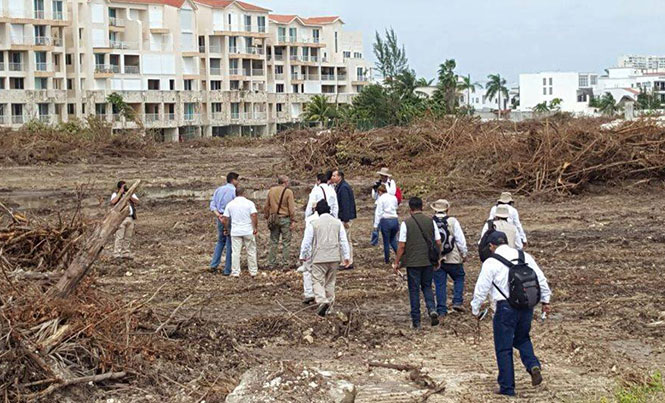
A few hours were enough to destroy what it took nature centuries to create. On January 16, close to 57 hectares of mangroves, now protected in Mexico, were destroyed near the Malécon Tajamar in Cancun.
In July 2005, the government gave the National Foundation for Tourism Promotion (Fonatur) permission to build and provide other tourist activities at the Malécon Tajamar Project in Cancun. The project includes the construction of a Catholic Church for the Legionaries of Christ, real estate developments, and tourist attractions.
SEMARNAT (Ministry of Environment and Natural Resources) evaluated the legality of the acts, assuring the developers complied with the time slated for the project to be built and obeyed the environmental laws. However, some environmental groups believe Fonatur omitted information to obtain the authorization. At the end of July 2015, the Mexican Center for Environmental Law (CEMDA) filed to have the destruction of the mangroves halted.
Enrique de la Madrid, the Secretary of Tourism has been quoted as saying the confusion regarding the legality of the development of Tajamar ¨stems from the changes to the law¨ regarding the protection of mangroves. Proponents for the development contend the law to protect the mangroves was passed after the development was approved by SEMARNAT and they are well within the law to continue.
Environmentalists have not remained passive and have been actively protesting the event. Their protests, both on location and in social media, brought attention to how crocodiles, iguanas, birds, and other species were affected, many of them were allegedly buried alive. Peaceful protests have continued at the site.
Laura Rendón Reyes, a well-known activist, when asked about the current situation, responded, “The place is destroyed. Now they are throwing around the idea of creating an eco-park. They think that the citizens will be swayed to go along with them. The place could also be sold to the highest bidder. We demand the punishment of those responsible, individuals and government officials alike, the recuperation of the whole area with new mangroves planted, and the implementation of other ecosystems which are being extinguished in the name of progress and development.”
The future for Tajamar is uncertain. Although the Second District Judge ordered a stop to construction, this is temporary.
This case is already bringing international repercussions with the social media site Change.org asking Mexico to withdraw their petition to be the site of the 13th Annual Biological Diversity Convention, which will take place in Cancun. They petition the convention should not be hosted by a country whose government practices ecocide. 75,000 signatures have been gathered to date.